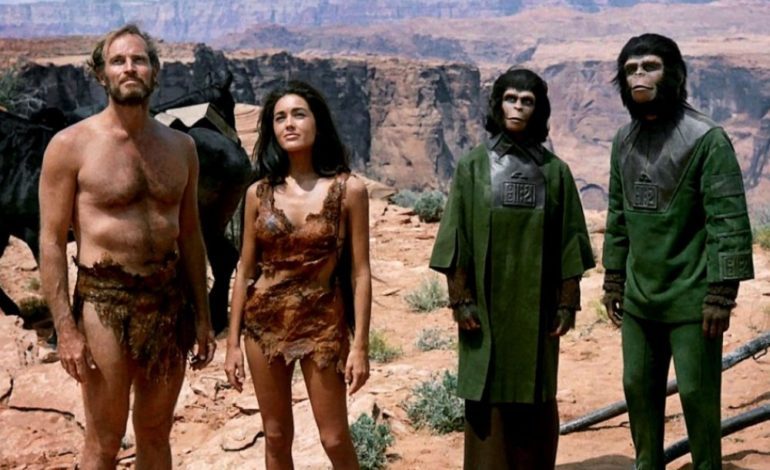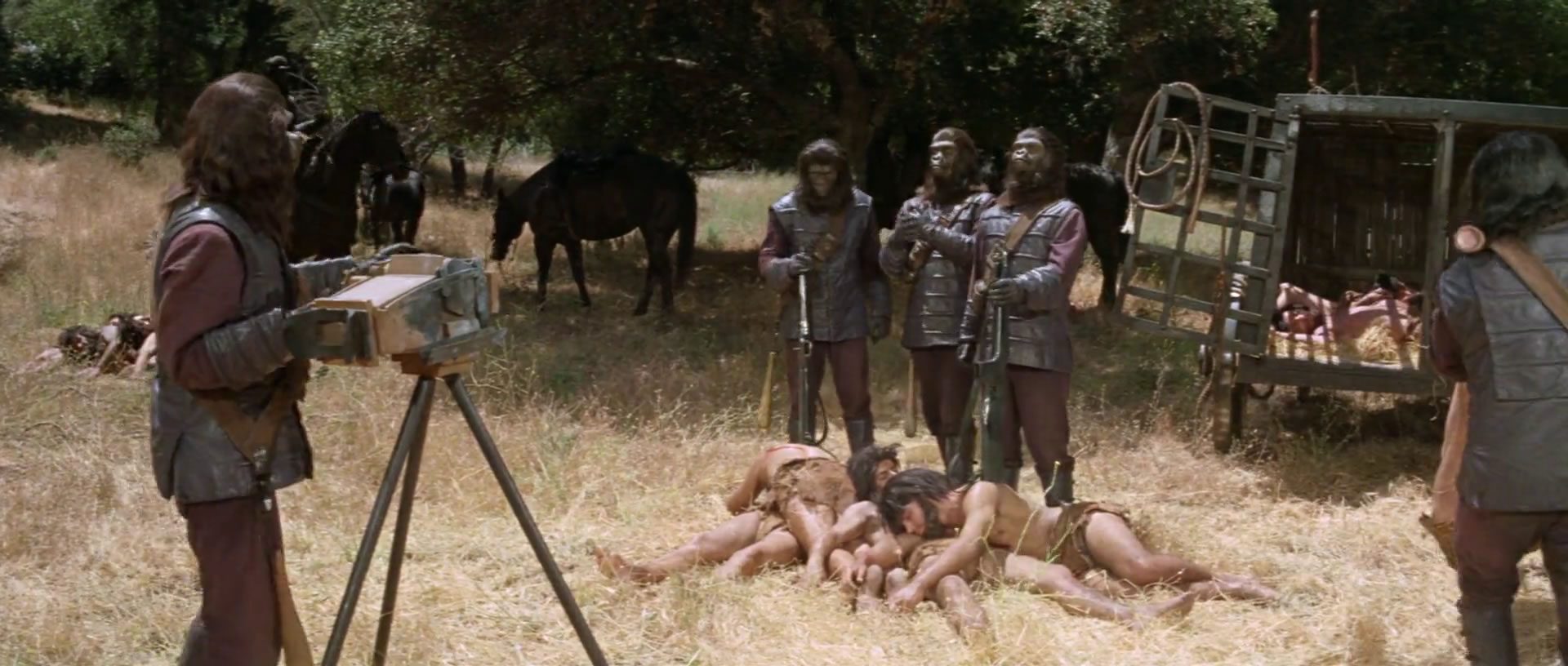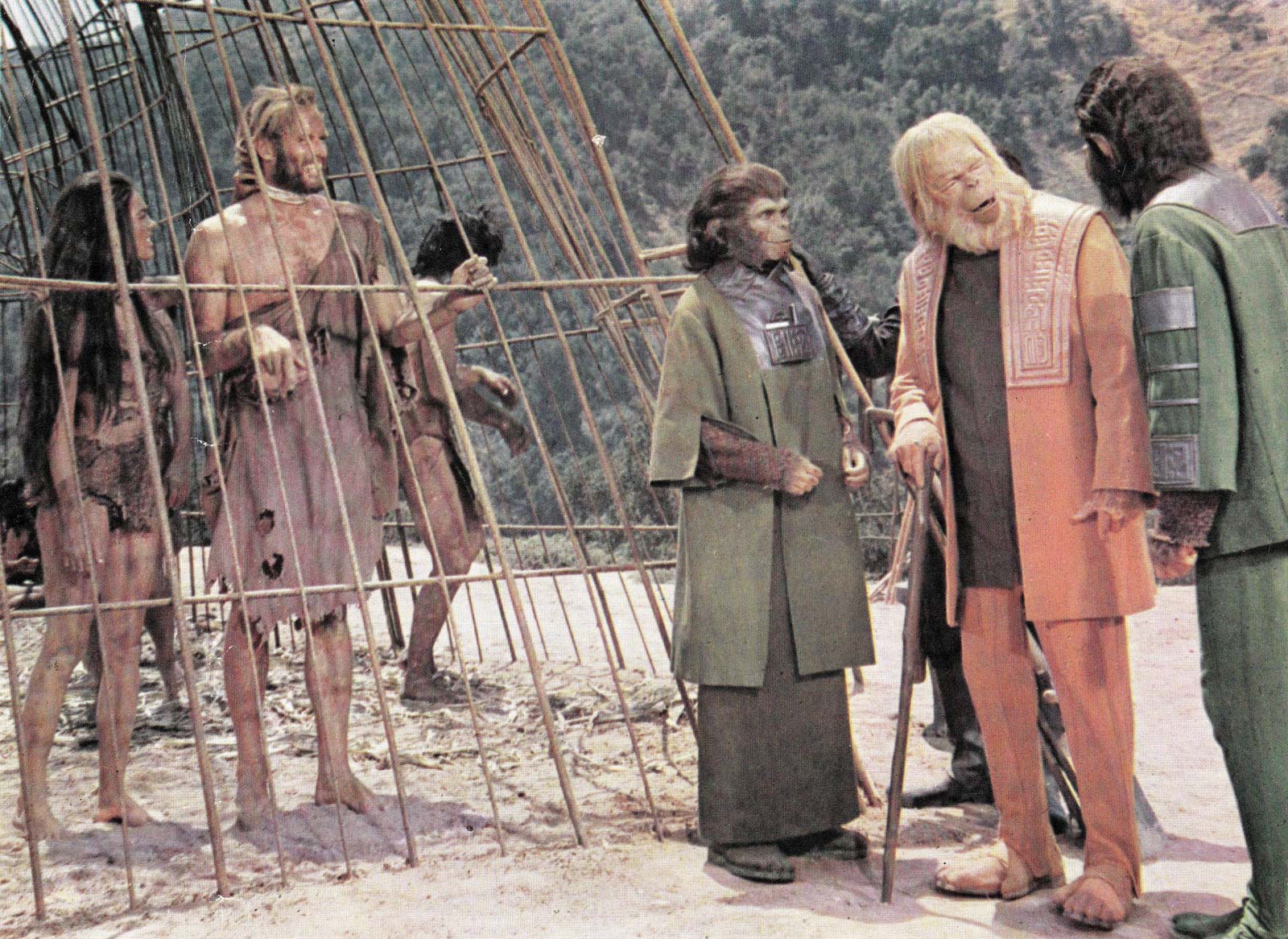

“Does man, that marvel of the universe, that glorious paradox who sent me to the stars, still make war against his brother?” These are the first words uttered by a flu-ridden Charlton Heston during the opening sequence of the iconic film Planet of the Apes. Playing a character named Taylor, Heston laments and reflects while aboard his deep space craft, contemplating the conditions of his own species as he travels through the unknown universe.
Taking a small crew of four to explore, Charlton Heston locks himself in a deep cryosleep only to wake up his ship crashed and the only female member in his group dead. Escaping a sinking ship, he and his remaining crew members, Landon and Dodge begin to explore this new wasteland. For days they travel and trek the barren soil of the planet until stumbling upon other humans in a corn field — all scantily clothed and primitive in appearance-looking for food and shelter until they hear a large sound. The crew members, bewildered by this site, stand and stare as they run only to follow suit once they hear gunfire. We follow the unarmed humans and Heston’s crew as they zig and dash from place to place trying to escape their horse-riding captors, until the camera locks onto one particular rider who reveals himself to be an ape.
Despite the film’s title outright stating its premise, the way in which this scene builds to the reveal of who has the ultimate power is still a masterpiece of drama. First implicated by sound alone in the distance, the primitive humans more aware of this world than our main cast respond appropriately. Then it cuts to a shot of an entire regiment on horseback with guns, low angels proceed as the escaped run hiding the identities of our ensembles’ foil until the big zoom reveal.


During the subsequent chase scene, Landon goes missing and Dodge is killed in the fields. Heston, shortly after being shot in the neck, gets captured and is rounded up along with the other human captives. The long take following his capture is particular horrific in its’ relevance as squirming human children are hauled away, humans are rounded up like cattle into cages and the apes take a photographic memento of their new kill. The shot feels like a parody of a hunting expedition, yet it conjures mental images that remind one of different political and social issues that remain impactful today like ICE, slavery, and the Abu Ghraib prison incident.
Even at a half century old, this film still feels as raw today as it did in ’68. Combined with the bizarre and atonal score of Jerry Goldsmith, the world of Planet of the Apes looks all too familiar yet maintains an eerie sense of foreignness. With the 60’s bringing about some of the best in science fiction that cinema had to offer, including the likes of 2001: A Space Odyssey and The Day the Earth Stood Still, Planet of the Apes more than earns its place amongst that cultural lexicon. And, having inspired other great films like Alien, Star Wars, and Jurassic Park, Planet of the Apes is a worldwide mainstay when it comes to sci-fi cinema.
When Taylor is taken to the ape’s city, it is here that both he and the audience are completely thrusted into the politics of ape culture. Being treated like an animal, science experiment, lower class being, and overall inferior creature to that of his ape captors bares striking resemblance to the racial history of the United States. These parallels become even more apparent during the trial scene when Taylor regains his ability to speak and, because of his irregularity as a thinking man, is put before ape jurors to determine his fate. Despite interjections and defense from a pleading Dr. Zira (Kim Hunter), who is fascinated with Taylor, and the astronaut being able to defend himself verbally, the court continues to ignore him and discredit all of Zira’s views.


After escaping from the citadel alongside Nova (Linda Harrison), a female human he met in captivity, Taylor is pursued by the vindictive Dr. Zaius (Maurice Evans). This conflict takes them to a cave in the outskirts of their land that yields evidence which refutes the belief that apes came before man or that ape is superior. Yet this overwhelming evidence of a talking doll and human skeleton, while proving Taylor’s defense, ultimately hint at the film’s harrowing conclusion. After capturing Dr. Zaius, Taylor lets him go free along with Nova, only to ride the beach and find that his worst predictions had come true: that man’s inability to stop waging war had eradicated itself from the history books. The film ends on perhaps one of the most iconic twist in movie history, one that can most definitely be seen as a warning to everyone who watches this film.
Verdict: 4 out of 5 stars.
Planet of the Apes is a timely film that still hits you in the gut today. Despite its abrupt cuts in the beginning and a badly dubbed “Heston” laugh, this film still manages to make you forget all of its errors and still keep its tension, even with spoilers. From its sociological and political perspectives, to its display of the “Lucifer effect” and comments on revisionist history, It was, and continues to be, one of the most groundbreaking science-fiction films of all time.
